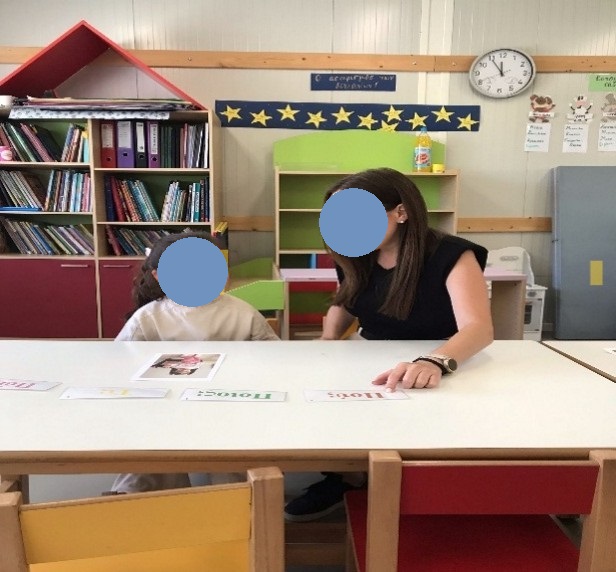EECERA Conference 2025 – Guest Blog # 6: Sharing Personal Stories
Posted 4th August 2025
One of a series of short blog posts by presenters who will be sharing their work at the upcoming annual conference in Bratislava, Slovakia. Any views expressed in this post are those of the author(s) and do not necessarily reflect the official stance of their affiliated institution or EECERA.
Sharing Personal Stories with Preschool Children from Disadvantaged Socioeconomic Backgrounds: The Significance of Group Presentation
By Dr. Hellen Vretudaki – University of Crete, Greece

Photo provided by author.
My presentation detailed the implementation of a structured intervention conducted with 19 preschoolers from socioeconomically disadvantaged environments. The primary objective was to bolster their capacity to produce organized and thematically coherent autobiographical narratives.
Underprivileged Preschool Populations In both my home country and globally, the literature on narrative discourse training predominantly examines children enrolled in urban kindergartens. Conversely, those attending remote schools—often from low-income families with limited literacy exposure—remain understudied (Adlof et al., 2024; Nicolopoulou, 2016; Spencer et al., 2021). Drawing on my extensive research over the past decade involving both typically and atypically developing preschoolers, I recognized a critical gap: the linguistic and narrative capabilities of children from underprivileged contexts warrant thorough investigation. Field visits and consultations with educators in rural kindergartens revealed that these children’s expressive language was severely constrained: utterances rarely exceeded two to three words, narrative attempts resulted in disordered event sequences, sentences were incomplete, lexicons minimally ranged, modifiers were absent, and verb tense usage was largely incorrect. Their storytelling profiles closely mirrored those documented among children with developmental disorders, notably reflecting weak autobiographical memory encoding.
Narrative Intervention Approach & Program Strengths
A notable precursor that informed our methodology is Favot, Carter, & Stephenson’s (2018) pilot intervention targeting children with autism spectrum disorder (ASD), which successfully employed personal family photographs as prompts to stimulate complete personal storytelling by addressing macrostructural elements such as “where,” “who,” “what,” and “feelings”. This technique is particularly effective given the well-documented challenge in narrative research of identifying appropriate scaffolds to elicit meaningful autobiographical discourse.
Our program selectively emphasized a simplified story structure—focusing on core components (e.g. characters, setting, event, emotions)—instead of the full narrative schema (including resolution and temporal markers), which is often cognitively excessive for preschoolers even under optimal learning conditions. Longitudinal studies in my broader research portfolio demonstrate that only sustained and systematic exposure enables children to internalize and apply narrative coherence consistently.
Another distinguishing element was robust family involvement. Each participant’s guardians submitted a photograph from a recent personal event, accompanied by a written narrative. This approach allowed teachers to verify narrative accuracy, ensuring the recollections represented authentic experiential events rather than invented tales.
Sequenced Group Formats for Scaffolded Exposure Recognizing that communicative competence—alongside language—is often impaired among socioeconomically disadvantaged children and is intimately linked to theory-of-mind development (Curenton, 2010), we employed a tiered group intervention design. It began with one-on-one sessions, facilitating initial engagement and accommodating individual needs (notably benefitting a preschooler with ASD). We then progressed to small heterogeneous groups (4–5 participants mixing ages), enabling peer scaffolding. Subsequently, medium-sized cohorts (8–9 children) were formed to increase interactional opportunities. Finally, the entire class reconvened for full-group narrative performances, with and without photographic prompts. Through this gradual scaling, children advanced toward autonomously delivering organized personal narratives in front of peers—with the most prominent improvements observed during medium- and full-class sessions employing photographic supports.
Contributions and Originality This study extends Favot et al.’s (2018) work beyond its original ASD-focused context to a population historically marginalized in oral language research, namely preschoolers from underprivileged backgrounds. Moreover, by systematically testing the efficacy of a graduated exposure model—from individualized instruction through to full-class narration with visual prompts—we provided both linguistic and communicative scaffolding. These efforts are crucial given that language deficits among these children often correlate with reduced self-confidence and hindered social integration.

About the author:
Dr. Hellen Vretudaki is working as an Academic Teaching staff in the Preschool Department of the University of Crete, Greece. She holds an M.Ed. and Ph.D. from the University of Crete, Crete. She has got an additional specialization in Adult Education. She teaches in undergraduate and postgraduate study programs of the Pedagogical Department of Early Childhood Education at the University of Crete and gives lectures in postgraduate programs of studies at Universities in Greece and Cyprus. Her interests concern typical and special education needs preschool children’s oral language development focusing on narrative skills (retelling, personal and fictional narratives), Ste(a)m education and fine-motor skills cultivation in preschool ages. Following these interests, she has carried out many studies in which a variety of scaffolding techniques were applied. She has more than 40 published papers in International and Greek scientific journals. She has worked as an Evaluator of educational projects for the Centre for Education and Lifelong Learning of the Ministry of Education, Trainer for the Institution of Educational Policy in Greece (IEP), Member of scientific and organizational committees of Conferences at Greek and abroad, as well as a reviewer at scientific Conferences and International scholarly journals.
Personal research about young children’s narrative skills improvement:
Vretudaki, Η., Aggeli, A., Alexiou, P., & Diamantaki, E. (2023). Reading and creating books: bridging the distance from stories to e-stories. Journal of Early Childhood Research, 5,1-13. https://doi.org/10.1177/1476718X231186616
Vretudaki, Η. (2022). “Tell me the whole story”: Moving from narrative comprehension to narrative production skills. European Early Childhood Education Research Journal, 30(3), 1-12. http://dx.doi.org/10.1080/1350293X.2022.2098991.
Dr. Hellen Vretudaki will present work referred to in this blog in Poster Session A (Tuesday, 26th of August). (Schedule liable to change; please refer to final programme for details).
